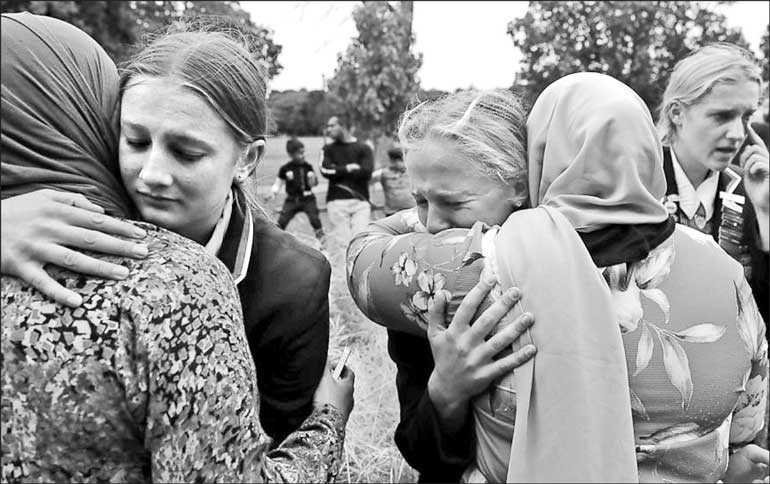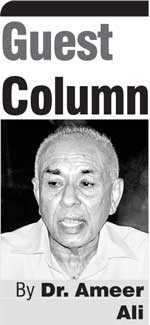Monday Feb 16, 2026
Monday Feb 16, 2026
Saturday, 30 March 2019 00:08 - - {{hitsCtrl.values.hits}}

When primordial instinct turns predatory
 The carnage in Christchurch, New Zealand, that killed almost 50 worshipping Muslims inside two mosques was not the first crime of Muslim hatred in history and will not be the last. The unassailable stand that Prime Minister Jacinda Ardern took in support of social and religious pluralism in New Zealand and globally, and the frankness with which she expressed her disgust and horror at the murderer and his poisonous ideology while demonstrating in multiple ways her sympathy with and attachment to the victims, is unique in the prevailing climate of Islamophobia in which politicians of all persuasions with an eye on the ballot box (especially in Western democracies), are soft peddling with this monster. Jacinda Ardern stands toweringly tall among them.
The carnage in Christchurch, New Zealand, that killed almost 50 worshipping Muslims inside two mosques was not the first crime of Muslim hatred in history and will not be the last. The unassailable stand that Prime Minister Jacinda Ardern took in support of social and religious pluralism in New Zealand and globally, and the frankness with which she expressed her disgust and horror at the murderer and his poisonous ideology while demonstrating in multiple ways her sympathy with and attachment to the victims, is unique in the prevailing climate of Islamophobia in which politicians of all persuasions with an eye on the ballot box (especially in Western democracies), are soft peddling with this monster. Jacinda Ardern stands toweringly tall among them.
The assailant who committed that heinous crime trumpeted that he was a ‘white supremacist’ who, with his co-supremacists, a tiny minority no doubt, wanted this world cleansed of Islam and Muslims. In the eyes of these supremacists, their target represents evil. What is evident from the Christchurch episode, as it was from a similar episode in 2011 in Norway, is the transformation of the primordial identity of Western nations into predatory identity with an anti-Islam expression.
Primordial identity is defined as the ‘unique traditions and culture’ of a society, and predatory identity as the ‘chauvinistic, aggressive and militaristic expressions, often targeting societies that differ from them, in ethnic or religious terms’. (Akbar S. Ahmed, ‘Journey into Europe: Islam, Immigration and Identity’, Washington: Brookings Institution Press, 2018, p. 20).
When the Western primordial identity exhibits an anti-Islam expression that identity is transformed into a predatory identity. That transformation did not take place as long as the West was able to subjugate the world of Islam and Muslims, and impose its will upon their polity, economy and even culture. Edward Said in his pioneering study of ‘Orientalism’ has shown how this subjugation was achieved. Once that grip over the world of Islam started slipping away, due to reasons explained below, the transformation from primordial to predatory identity became unavoidable and even respectable. Islamophobia with its associated violence is the sad reflection of that transformation. How did this transformation take place?
Western imperium
Even after decolonisation of Muslim lands, Western imperium did not lose control over the Muslim world. When Cold War began Islam was used instrumentally by the US superpower to checkmate Godless Communism. Even Arab socialism espoused by charismatic Nasser and few of his Arab contemporaries could not loosen the imperium’s grip over the Muslim world. With the overthrow of the Shah by the Khomeini inspired revolution and subsequent expulsion of all Americans from Iran, the imperium’s hold over the Muslim world started loosening. Yet, more than the Iranian Revolution it was Al-Qaeda’s attack on the United States in 2001 that really shattered the imperium’s confidence.
That was not an attack just to register the attacker’s hatred of democracy and freedom, as President George Bush berated before launching his anti-terrorism ‘Crusade’ (a term he was advised to withdraw almost immediately in fear of rekindling the medieval Christian animosity towards Islam), but an attack that signified not only the changing dynamics of centre-periphery relations under post-colonialism, as Salman Sayyid argues (‘A Fundamental Fear: Eurocentricism and the Emergence of Islamism’, London: Zed Books, 2015 edition) but also, and more importantly, the re-emergence of an enemy that Western imperium thought to have defeated and kept under subjugation until very recently. Al-Qaeda challenged the very foundation of the Westphalian based world order.
Attack by a state and non-state actor: US response was the same
60 years before Al-Qaeda’s attack, Japan did the same on Pearl Harbour in 1941. The difference between the two was that the first was launched by a state while the second by an elusive non-state actor. Yet, the response from US was the same. In retaliation, US bombed Japan with atomic weapons, annihilated Hiroshima and Nagasaki and forced its government to surrender to the will and might of West’s imperium. In the same manner in 2001, US and its allies mistook Al-Qaeda for a state or state-based entity and bombed, destroyed, invaded and occupied Iraq and Afghanistan, states that were not the home of that elusive enemy. Al-Qaeda escaped from their net, refused to surrender, set an example to other non-state Muslim actors and even tutored them the techniques of how to confront a states-centric imperium with transnational Islamism.
A supercilious US, confident of its military might thundered that there was no place anywhere in the world for the enemy to hide, and with support from its allies, escalated the War on Terrorism, causing death and devastation in a number of Muslim countries, beside Iraq and Afghanistan. Deaths and devastation destabilised, dislocated and destroyed several Muslim nations such as Pakistan, Somalia, Syria, Libya, Sudan, Yemen, Nigeria, Palestine and Lebanon. Thousands died and millions were impoverished and became homeless. While Muslims perished and their economies shattered, the War on Terror cost Western economies trillions of dollars that otherwise could have been spent to benefit their own citizens. According to one estimate, US alone spent $ 1.6 trillion in the occupation of Afghanistan and Iraq. What a colossal waste!
Double jeopardy
The only way out for the war victims was to migrate to places where they could at least sleep at nights without falling victim to a bomb. US, Canada, the UK, EU countries, Australia and New Zealand became favoured destinations. However, the influx of Muslim refugees with their cultural baggage into Western nations took place at a time when Western economies themselves were facing slowdown in growth.
While Al-Qaeda’s Islamist challenge threatened the Westphalian world order, globalisation brought tremors to the post-World War II economic order. The rise of China followed by India meant that economic power was shifting from the centre to the periphery. The simultaneity in the collapse of a hegemonic West along with its economic superstructure on one side and rise of multiple economic power houses with geopolitical implications on the other spelt double jeopardy to the West’s primordial identity.
The post-World War II generation of ‘baby boomers’ in the West and its Y generation who were fortunate to enjoy a plethora of economic entitlements delivered by a prosperous welfare state, now witnessed those entitlements evaporating in stages by governments that faced repeated budget crises. Economics of Keynesianism that backed the welfare state lost its rationale in the face of stagflation in the late 1970s and 1980s. Governments had no choice but to roll back their interference in income distribution and started transferring that function to the market forces. The result was persistent unemployment and widening income gap. As long as economic growth was robust and affluence was taken for granted, any excess demand for labour in Western factories and farms was satisfied by importing cheap labour from outside. Immigration rules were relaxed and surplus labour from former colonies in Asia, Africa and the Middle East, and among them tens of thousands of Muslims flocked to the West with their families. They worked hard and established their own enclaves with all Muslim cultural accoutrement. There was an air of tolerance at that time and the primordial identity of receiving societies rarely felt threatened by this Muslim influx.
A radical shift
That tolerance changed after 2000 when globalisation shifted the economic growth pole outside the West and Islamism threatened the Westphalian order with its own Islamic Order. In addition to these and tough somewhat related to them, two other developments worsened the situation. One was a shift in the theatre(s) of War on Terror from far away Muslim lands to Western cities, and the other was a new wave of Muslim refugees, themselves a product of the War on Terror.
The time was now ripe for politicians of the Far Right to emerge exploiting the twin deterioration in domestic security and economic prosperity. To them Muslim immigration and Islamophobia became vote winning trumps. As the centre right and centre left parties saw their traditional supporters deserting them and moving to the far right they had no choice but to speak the same language although with great subtlety.
‘White Supremacy’ is not something new that came out suddenly. In a sense, it is the product of Orientalism. Similarly Islamophobia occupied European mindset ever since the Battle of Poitiers in 733. They remained subdued under the shade of Western political and economic hegemony. The collapse of that hegemony has enabled the primordial identity to metamorphose into a predatory identity. The Christchurch massacre was its latest manifestation.
In a global economy in which the armament industry is singularly the largest money spinner and contributor to global economic growth no amount of gun control is going to make even a dent on a weaponised economy and culture. Automatic and semi-automatic rifles are not the only devices that lunatics and haters can use to massacre innocents. There are other novelties in the murderous bazaar that they can access to. What the world needs is not gun control but a radical shift in what it produces, how it produces and to whom it produces. In the meantime, if external aggression, internal oppression and economic injustice can cease guns and weapons will automatically fall silent.
(The writer is attached to the School of Business and Governance, Murdoch University, Western Australia.)